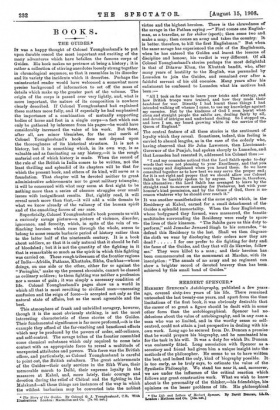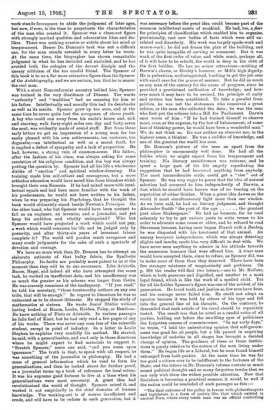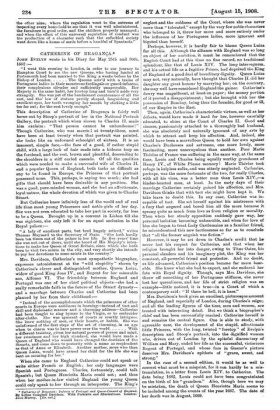HERBERT SPENCER.*
HERBERT SPENCER'S Autobiography, published a few years - ago, covered sixty-two years of his life. There remained untouched the last twenty-one years, and apart from the time limitations of the first book, it was obviously desirable that the career of so great a figure should be dealt with in some other form than the autobiographical. Spencer had no - delusions about the value of autobiography, and in any case a man who was so limited, and in the worthy sense so self-. centred, could not attain a just perspective in dealing with his own work. Long ago he secured from Dr. Duncan a promise. that be would prepare his biography, and he nominated him for the task in his will. It was a duty for which Dr. Duncan was eminently fitted. Long association with Spencer as a - secretary and friend had given him a unique insight into the methods of the philosopher. He seems to us to have written the best, and indeed the only, kind of biography possible. It. is too early, as he truly says, to estimate the value of the Synthetic Philosophy. We stand too near it, and, moreover, we are under the influence of the critical reaction which follows any great constructive work. What we wish to know about is the personality of the thinker,—his friendships, his opinions on the lesser problems of life. His philosophical * The Life and Letters of Herbert Spencer. By David Duncan, LL.D. London : Methuen and Co. [Zs. net.]
work stands foursquare to abide the judgment of later ages, but now, if ever, is the time to perpetuate the characteristics of the man who created it. Spencer was a clean-cut figure with strongly marked qualities and adamantine likes and dis- likes. There was nothing evasive or subtle about his mind or temperament. Hence Dr. Duncan's task was not a difficult one, for the man stands revealed in every letter he wrote. At the same time, the biographer has shown remarkable judgment in what he has included and excluded, and he has avoided both the eulogies of the devout disciple and the uneasy criticism of the too candid friend. The Spencer of this book is to us a far more attractive figure than the Spencer of the Autobiography, and we are certain, too, that he is nearer the real man.
With a stout Nonconformist ancestry behind him, Spencer was trained in the very dissidence of Dissent. The words " authority " and "tradition" had no meaning for him or his father. Intellectually and morally this had its drawbacks as well as its merits. Spencer grew up too soon, and at the same time he never quite lost the arrogance of clever youth. A boy who could run away from his uncle's house and, sick and starving, walk forty-eight miles one day and forty-seven the next, was evidently made of sound stuff. But from these early letters we get an impression of a young man far too easily pleased with his own achievements, too cocksure, too dogmatic,—an intellectual as well as a moral fault, for it implied a defect of sympathy and a lack of proportion. He had, however, a strong vein of common-sense. His father, after the fashion of his class, was always asking for some revelation of his religious condition, and the boy was always putting the question by. Spencer had all his life a wholesome dislike of "unction" and spiritual window-dressing. His training made him self-reliant and courageous, but a more orthodox education would have saved him from blunders which brought their own Nemesis. If he had mixed more with intel- lectual equals and had been more familiar with the work of his predecessors, he would not have written to his father, when he was preparing his Psychology, that he thought the book would ultimately stand beside Newton's Principia. On the other band, who but Spencer would have been content to fail as an engineer, an inventor, and a journalist, and yet keep his ambition and vitality unimpaired ? Who but Spencer would have projected a work which could not pay, a work which would consume his life and be judged only by posterity, and after thirty-six years of incessant labour complete it? The world will pardon much arrogance and many crude judgments for the sake of such a spectacle of devotion and courage.
We have no more wish than Dr. Duncan has to attempt an elaborate estimate of that bulky fabric, the Synthetic Philosophy. Its faults are probably more patent to us at the moment than they will be to our successors. Like Aristotle, Bacon, Hegel, and indeed all who have attempted the same task, he worked on insufficient data, and his insufficiency was so much the greater as his scheme was larger than theirs. He was scarcely conscious of the inadequacy. "If you read," he told his secretary, "three trustworthy authors on any one tribe, that will be enough." In regard to literature he was so unlearned as to be almost illiterate. He stopped the study of mathematics at sixteen. He wrote Social Statics without having looked at Bacon, Locke, Hobbes, Paley, or Bentham. He knew nothing of Plato or Aristotle. In various passages he falls foul of Kant, but he had only read a few pages of any of his works. There was never any man less of the scientific student, except in point of industry. In a letter to Leslie Stephen he explains very candidly his method. He started, he said, with a generalisation, and read only in those directions where he might expect to find materials to support it. "Scratch Spencer," some one said, "and you come upon ignorance." The truth is that, to speak with all respect, he was something of the journalist in philosophy. He had a mass of general information which he used to form his generalisations, and then he looked about for further proof, as a journalist turns up a book of reference for local colour. It was his supreme good fortune to live at a time when his generalisations were most necessary. A great idea had revolutionised the world of thought. Spencer seized it, and worked it out empirically in the chief domains of human knowledge.. The working-out is of course insufficient and crude, and will have to be redone in each generation, but it
was necessary before the great idea could become part of the common intellectual assets of mankind. He had, too, a flair for principles of classification which enabled him to organise, provisionally, vast new bodies of facts which were still un- related and disorderly. His work was largely spade-work and mason-work ; he did not dream the plan of the building, and he was quite incapable of carving or ornament. But it was work of the first order of value, and while much, perhaps all, of it will have to be rebuilt, the world is deep in the debt of the first builder. He has no minor attractions—nothing of Darwin's charm, or Huxley's humour, or Mill's high dignity. He is pedestrian, undistinguished, bustling to get the job over with small care for the graces of manner. But he did as much as any man of the century for the cause of progress, since he provided a provisional unification of knowledge ; and how- ever much it may have to be revised, the principle of unity and system has been established. To take a parallel from politics, he was not the statesman who conceived a great reform, or the man who collected the data ; be was the man who first put the scheme into a Bill for Parliament. Darwin once wrote of him : "If he had trained himself to observe more, even at the expense, by the law of balancement, of some loss of thinking power, be would have been a wonderful man." We do not think so. He was neither an observer nor, in the highest sense, a thinker. He was a codifier of knowledge, and one of the greatest the world has seen.
Dr. Duncan's picture of the man as apart from the philosopher is uncommonly well done. He had all the foibles which we might expect from his temperament and training. His literary sensitiveness was extreme, and he spent a large part of his life angrily repudiating the suggestion that he had borrowed anything from anybody. The most inconsiderable critic could get a "rise" out of Spencer. He was very eager to prove that the idea of natural selection had occurred to him independently of Darwin, a fact which he should have known was of no bearing on the reputation of either thinker. When a great idea dawns on the world it must simultaneously light more than one window. As we have said, he had no literary judgment, and thought
Alexander Smith "the poet of the age the greatest poet since Shakespeare:' He had no humour, for he used solemnly to try to get various poets to write verses to his order to advocate some cause or other, and be refused to read Stevenson because, having once begun Travels with a Donkey, be was disgusted with his treatment of that animal. An uneasy bourgeois independence, which was always detecting slights and insults, made him very difficult to deal with. We have never seen anything to admire in his attitude towards the numerous honours that were offered him. A wiser man -would have accepted them, since to refuse, as Spencer did, was to make more of them than they deserved. There have been few stranger mixtures of magnanimity and pettiness. On p. 388 the reader will find two letters,—one to Mr. Balfour, which is both generous and dignified, and another to a most loyal friend, which is like the work of a spoiled child. Yet for all his foibles Spencer's figure was one of the noblest of his generation. He loved truth and justice as few men have done, and his courage never failed him. He could not adopt an opinion because it was held by others of his type and fell into the general line of his thought. On the contrary, he demanded that each article of his creed should be separately tested. The result was that he acted as a candid critic of all parties, holding out before the unwilling eyes of politicians the forgotten canons of common-sense. "In my early days," he wrote, "I held the unhesitating opinion that self-govern- ment was good for all people, but a life passed in acquiring knowledge of societies in all stages has brought a decided change of opinion. The goodness of these or those institu- tions is purely relative to the nature of the men living under them." He began life as a Liberal, but he soon found himself estranged from both parties. At the same time he was far too good a citizen ever to be indifferent to the fortunes of the State, and the letters in Dr. Duncan's volume contain so much sound political thought and so many forgotten truths that we can only wish them the widest possible attention. Now that Socialism is becoming a practical menace, it would be well if the nation could be reminded of such passages as this :— " The final outcome of the policy in favour with philanthropists and legislators is a form of society like that which existed in ancient Peru, where every tenth man was an official controlling the other nine; where the regulation went to the extreme of inspecting every household to see that it was well administered, the furniture in good order, and the children properly managed ; and when the effect of this universal regulation of conduct was the production of a character such that the enfeebled society went down like a house of cards before a handful of Spaniards."








































 Previous page
Previous page